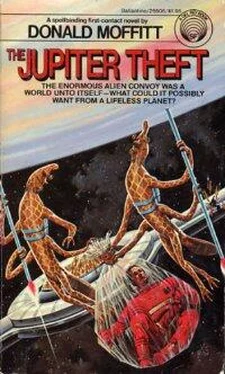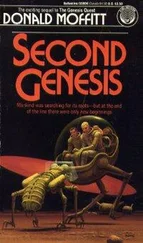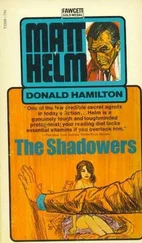They were out of the Hall of Bipeds and beside the towering glass cliff that contained the Jovians. Maggie gasped, and Dmitri lagged behind like a small boy.
There was a vast churning within the cloudy liquid, and one of the enormous pancake shapes came hurtling toward them to flatten its quarter acre of surface against the glass. The floor beneath their feet shook with the impact.
“One crack in the glass and it would be all over—for them and for us,” Ruiz said. “If the liquid hydrogen didn’t instantly freeze us solid, the explosion when a creature that size depressurized would blow us to bits.”
“Let’s get out of here,” Maggie said nervously.
The Jovian, its scalloped outer mantle curled around the shaft of its hundred-foot harpoon, was hammering on the glass with the butt.
“It’s angry,” Jameson said. “I don’t blame it. It can’t imagine how it ended up in this—goldfish bowl.”
“This goldfish bowl is all there is in the universe for them now,” Ruiz said gruffly. “I wonder if it thinks we’re responsible.”
Dmitri was staring entranced at the living mountain of flesh. “No skeleton—very sensible for a creature that lives at a pressure of a hundred thousand atmospheres. And the ratio of surface area to volume—”
Jameson pushed him along and got him, still talking, out of the mammoth aquarium. The two humanoids waited impatiently for them ahead. They seemed to know where they were going. They threaded their way among the empty cages and drained tanks of the empty exhibition hall toward the warehouse section that Jameson had intended to head for. Had they been to the zookeepers’ living quarters too?
They set up a shrill chattering, and Jameson hurried to catch up. He stopped when he saw what they were excited about.
A dead Cygnan lay sprawled in a pool of orange blood next to the tank it had been caulking. The back end of its body was a glistening hash. It must have been trying to run away when the stream of explosive splinters caught it.
Some of Klein’s handiwork.
“When the Cygnans find this corpse, they’ll be hunting us down like vermin,” Jameson said.
“That’s what we are, aren’t we?” Ruiz said. “Rats in the walls.”
The door to Tetrachord and Triad’s quarters had been blown open. Jameson sniffed the air.
“They must have had plastic explosive,” Jameson said.
“They did,” Dmitri said. “I heard Gifford say that Klein had it molded to look like the soles of his boots.”
“Those heavy boots that were so out of place in space,” Jameson said. “Nobody ever thought to question them.”
“How could you?” Maggie said. “I mean, something like that is too far out.”
The cramped interior of the zookeepers’ apartment had been torn apart. Objects had been swept off the spoon-shaped shelves and trampled underfoot. The graduated set of miniature resting perches had been wantonly smashed. Jameson recognized their special poignance now. Nursery furniture.
The Moog was still where he’d left it, but it had been hammered into junk. “The son of a bitch!” Jameson flared. “He didn’t want anyone talking to the Cygnans after he was gone!”
He searched the litter. The cupboard that had held the little arsenal of neural weapons was empty. Klein’s party was armed to the teeth now.
“If we do catch up with Klein, what do you expect to do?” Ruiz asked tartly.
“We’ll worry about that when we catch him,” Jameson said and kept on looking.
He found what he wanted among the litter on the floor. Klein had overlooked it, or hadn’t realized what it was.
One of the two-pronged electric prods the Cygnans had herded him with.
“It doesn’t have any reach,” Maggie said. “It’s no better than a knife or a club. You can’t get near someone with a gun.”
“It’s better than nothing,” Jameson said, sticking the implement in the waistband of his shorts.
He poked his head out the other door to make sure there were no Cygnans in the warehouse section, then led his troops outside. The two little humanoids scampered along beside them, their silky fur bouncing.
He knew the worst even before he reached the stacks of looted human artifacts. Why had he ever led Klein here?
The junkpile had been thoroughly picked over for anything useful. Spacesuits, of course—enough to outfit Klein’s whole party. The ones that hadn’t been taken were slashed, faceplates smashed, hoses pulled out.
Maggie held up a slashed suit, tears running down her face. “Why? Why didn’t they leave the rest of us a chance? Just a chance! ”
“They don’t want us to have a chance,” Ruiz said, his face grim. “The people they left behind are a complication in their plans. I’ll tell you what I think. I think the first missile they intend to fire will be targeted for this pod.”
“No!” Jameson cried. “Not even Klein or Chia would do a thing like that! Disable the spine of the ship, they said! They wouldn’t slaughter their own people!”
“Types like that always start with their own people,” Ruiz said.
Dmitri was rummaging in the piles of goods. He came up with a fire ax that had been overlooked and stuck it in his belt. Maggie collected a bottle of alcohol and some cotton and, after she had explained their use, then said: “Don’t look shocked. I come from a family of rebs.” Ruiz found a kitchen knife and tied it to the end of a fiberglass pole that had been part of a stretcher. Jameson armed himself with an eighteen-inch crescent wrench and then, in the same tool locker, found a six-pound maul and an assortment of chisels. After some thought he tied a nylon cord around the handle of the maul and stuffed a coil of twenty or thirty feet of line inside his shirt.
“Something’s moving!” Maggie cried. “Over there!”
Jameson whipped around and saw a tiny glittering thing emerge from a pile of castoff clothing and begin to climb the slanting wall. Before he could do anything there was a blur of pink motion as one of the diminutive humanoids streaked for the thing. It trapped it in a dainty four-fingered hand and presented it to Jameson.
Jameson looked it over and immediately smashed it beneath his heel.
“What … was it?” Dmitri said.
“Piece of electronics,” Jameson said. “One of Klein’s motile probes. Pinhead lens, rice-grain mike, little magnetized ball-bearing wheels, trailing a spider-thread antenna. It must have been activated by our movements or body heat. Klein’s watching his rear.”
“So now he knows we’re after him,” Ruiz mused.
“Probably. I don’t know what the range of a thing like that is.”
“How do we find them?”
“Good question. He’s got those miniature probes to scout out a safe route for him. Wish we had the same. Or at least a bloodhound. Now, which direction did he go in?”
He looked around the expanse of floor, frowning.
“What’s got into them?” Maggie said.
The two humanoids were behaving oddly. They were prowling the area on all fours—not on hands and knees, as people would have done, but bent double in an impossible arch, walking on the tips of their toes and the backs of their little hands, with their fingers curled up. The position seemed entirely natural for them. They moved with a supple, spidery grace, their faces casting back and forth a half inch from the floor.
Dmitri watched them intently as they worked in widening circles, then turned to Jameson.
“I think you’ve got your bloodhounds,” he said.
They climbed more than a mile before they saw their first live Cygnan. Klein had been correct in his assumption: Even in an artificial environment that was more crowded than Hong Kong or Dallasworth there were service and utilities routes that were untraveled and almost unvisited.
Читать дальше












